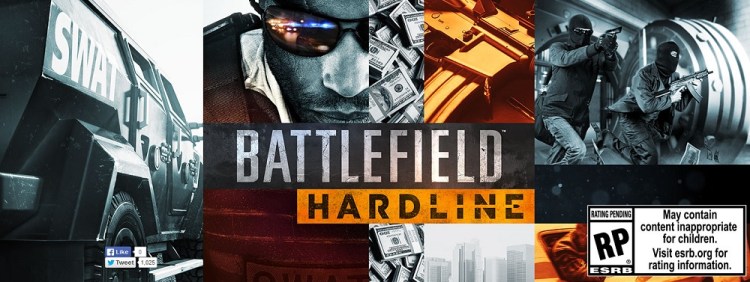Electronic Arts has a lot at stake in Battlefield: Hardline, the first-person shooter cops-and-robbers video game that debuts today. If it succeeds, it will open a new front in the Battlefield series, pivoting from modern military combat to something that’s more akin to Grand Theft Auto.
If EA can establish Hardline with gamers, it will have a new cash cow franchise in the multibillion-dollar shooter market. And it will validate EA’s Visceral Games studio, maker of the Dead Space series and its attempt to spread the spirit of Battlefield to a new category.
Steve Papoutsis, the general manager of EA’s Visceral Games studio, served as executive producer of Battlefield: Hardline. I recently interviewed him at EA’s headquarters in Redwood City, Calif. He said the designers focused on speed, story, and strategy to make both the single-player and multiplayer versions stand out. Hardline has a gripping crime-drama story that Papoutsis says will hold your attention like a favorite TV show.
Here’s an edited transcript of our conversation.
GamesBeat: How do you position Battlefield now? Games like Grand Theft Auto out there, or Watch Dogs, and all the military games as well. What’s the message you would want to get to gamers about where Hardline fits in the larger world?
Steve Papoutsis: All the games you mentioned are great. Hardline lands squarely in the Battlefield world, but we’re bringing a new flavor to it with the emphasis on speed, story, and strategy. We’re re-creating these cops and criminals situations that provide strategic gameplay, emphasize teamwork, and play really fast. With the new vehicles and gadgets, everything is about getting players into the experience, having fast engagement times, and having fun.
GamesBeat: What are some of the new modes and experiences in multiplayer?
Papoutsis: Hardline features seven game modes, two of which are classic Battlefield modes: Team Deathmatch and Conquest. Then we have five new modes. Those include Hotwire, which is a mode where both the cops and criminals are trying to take control of vehicles placed around a map. The longer you drive a vehicle, the more points you score, and the better chance you have to win the match. It’s focused on high-speed chases, crashes, jumps, and working as a team.
Then we have Blood Money, a match where there’s a pile of cash on the map that both the cops and criminals are trying to get to. The police want the cash as evidence and the criminals just want the money. Both teams race toward that cash and try to bring it back to their own vaults. It creates a lot of cool opportunities for players to sabotage the vaults and steal money from the other team.
Heist is your classic cops-and-robbers mode, where the criminals try to break into a location, like a bank, to get away with the loot and take it to helicopters that are waiting to extract the cash. The cops are trying to stop them. Then we have two all-new e-sports-focused modes, Crosshair and Rescue. These are five-on-five modes geared toward the competitive players that want to have a very fast, frenetic experience.
In Rescue the cops try to rescue hostages the criminals have taken. That mode plays out over the course of various rounds. Crosshair features permanent death. Once someone’s out, they’re out until the match concludes. In that mode, the criminals are trying to take out an informant the police are escorting to a getaway location.
GamesBeat: Battlefield’s known for its realism. I wonder how you’ve approached some of these scenarios where the criminals are maybe unrealistically well-armed, with helicopters and things like that. Is the focus just more on fun there, or did you try to take a degree of realism into account for Battlefield fans?
Papoutsis: We definitely put realism in the forefront of our decision-making throughout the course of development. We researched a lot of different cop-versus-criminal situations. Things like D. B. Cooper jumping out of a plane. There are situations where criminals do have access to things like helicopters, as one example.
We also got great feedback from our early beta on some of the weapon choices we had. Battlefield has such a rock-solid grounding in rock-scissors-paper gameplay, where various elements counter each other. In our early beta we had things like rocket launchers as part of your loadout. Those were great for taking out vehicles or helicopters. We needed those from a design perspective. But players felt they were too overpowered, and to your point, not really appropriate for the fiction.
Our design team went off and thought of ways we could include those things and make them more special, so that when you obtained one of those it really felt unique. They created these battle pickups throughout the map that almost become mini-objectives. If a team can control them, they have access to that more high-powered weaponry.



